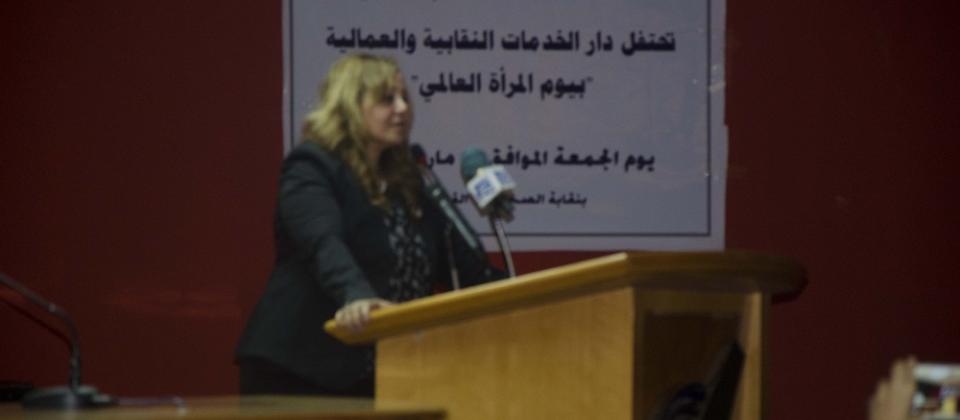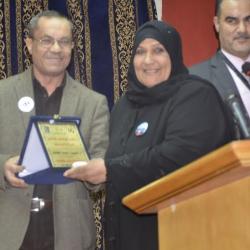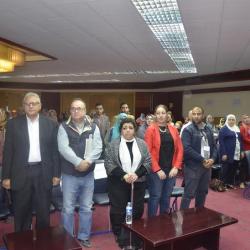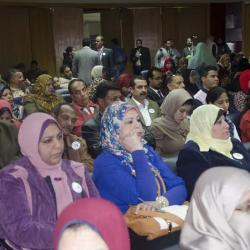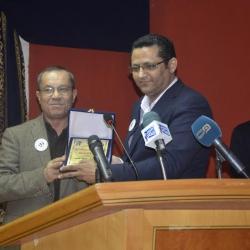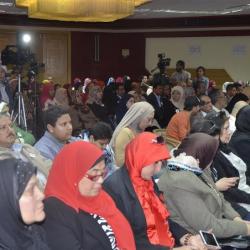The Permanent Conference for Women celebrates the International women’s day and launches its first report “Working Women between Discrimination and Marginalization”
- Permanent Conference for Working Women
- Seminar
- Journalists Syndicate
The Center for Trade Union and Worker Services on Fridays March 11, 2016: in the context of its program “The Permanent Conference for Working Women”, The Center for Trade Union and Worker Services celebrated the international women’s day in the press syndicate. This was part of its strive to improve the conditions of Egyptian working women.
Khaled Al Balshy, journalist and member of the board of the press syndicate inaugurated the celebration. He spoke about the role of the Egyptian woman since the Mahala Textiles strike in 2006 even though this was not reflected noticeably. He pointed out that the representation of women in the general assembly of the press syndicated reached 35% and despite this they are represented in the board of the press by only one woman. He also saluted the women workers in the quarries in Menya, the mothers of martyrs, detainees and the husbands of detained women.
Journalist and member of the National Council for Dr. Nashwa Al Houfy also spoke about the effective role of women in society and how she is the secret behind the societal course and men’s successes.
Dr. Amal Abdel Hamid also presented the first report of the permanent conference for women “Working Women Between Discrimination and Marginalization” that deals with the conditions of working women in the different work sectors (Public/governmental/private/informal) in terms of the most important problems that women face inside work and unions and the reasons of these problems and their effects on working women and society in general. The report also concentrated on the sectors of education, health, rural guides, and the informal sector in five governorates (Greater Cairo/ Alexandria/ Suez/ Ismailia/ Qena).
The report’s methodology depended on monitoring and analyzing the problems of working women inside work and unions in the different sectors that different women are subjected to in their work and the effects they have on their practical life and their family life. It also speaks of the methods suitable for solving these problems through poll applications that concentrated on a number of axis that included several questions through which the problems of women, the reasons for them and how they affect the role of women in society were revealed.
The research targeted a research sample of 150 women between the ages of 21 and 55 with an education that ranges between a middle school certificate and university degree. Their work experience years ranged between three and thirty years. Some of them work permanently and others with temporary contracts. Their social status also varies between married and unmarried.
The results of the poll showed the presence of several problems in terms of wages, form of contract, discrimination, lack of equality in rights despite the laws that grant equality, transportation, nurseries, employment for more hours than stipulated by law, work in official holidays in the private and investment sectors, the breastfeeding hour that is granted by law but the working woman is not able to make use of because the nursery is not close to the work place, lack of health and occupational safety measures that makes the work place unsafe, lack of equality and disregard for the conditions of working women in providing training that prepare for the acquiring of leadership positions or promotions and harassment in work and out of it especially among those who work in the private and investment sector.
The report demanded the necessity that Egypt implement the Convention on the Elimination of all Forms of Discrimination against women and eliminating discrimination against domestic workers in the unified labour law. It also demanded that women be integrated in the labour market and in all development projects; developing the health and social insurance systems in a way that grants social, health and educational security of working women especially in the informal sector and providing free treatment in hospitals and health units and the solidarity of civil society organizations in improving the conditions of working women; elevating women’s awareness in revealing truth about all violations they are subjected to in their places of work; empowering women to defend their rights in work places and form groups of union leaders to monitor violations against women in the work place; spreading the culture of women’s rights and facilitating communications between those concerned with women’s rights; preparing reports, issuing periodic leaflets about working women and conducting research and presenting papers on protecting working women; helping the state put programs and policies aiming at improving the conditions of working women.
At the end of the celebration the following were honoured; mother of martyr Mohamed Al Guindy, journalist Amina Shafik and Khaled Al Balshy received the award for her, Mrs. Reda Abbas known as “the mother of Ismailia people” the manager of the “Ismailia Family” association and Fatima Fouad the head of the independent union for sales tax workers and one of the most important female union personalities. A film was also screened about the most important Egyptian working women.
Click here to find the First Report

